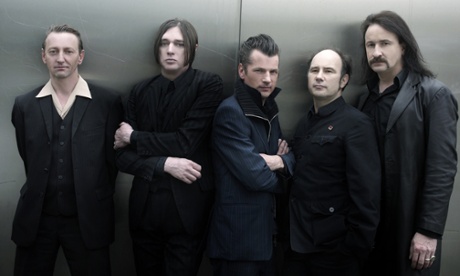The centenary of the outbreak of the first world war was commemorated in a variety of ways: sculptures were made, statues unveiled, lights switched off. But for out-of-the-box thinking, you have to take your hat off to the Flemish town of Diksmuide, site of the battle of the Yser in October 1914, which decided to mark the centenary by commissioning a performance piece from fearsome German experimentalists Einstürzende Neubauten.
In fairness, Einstürzende Neubauten are a marginally more user-friendly combo than they were 30 years ago, when every record they made sounded like an industrial accident happening at the same time as a catastrophic natural disaster and the finals of the All-German National Shouting Championship. Even so, no one is going to mistake Lament for music with mass appeal. It variously involves animal impressions, much banging of pipes and abuse of an air compressor, extracts from correspondence between Kaiser Wilhelm and Tsar Nicholas II sung through Auto-Tune, “statistical dance music” and “gigantic instruments and noise-generating devices that visually evoke the horrors of war”, including a barbed-wire harp. Anyone concerned they’re missing out by merely listening to the resulting album rather than seeing the show – perhaps having noted the band’s caveat that Lament “should be heard as a studio reconstruction of a work primarily designed to be performed live” – might note that, from opener Kreigsmaschinerie’s five minutes of deeply unpleasant scraping, clattering and roaring onwards, they do a impressively thorough job of aurally evoking them, too.
Lament’s existence seems all the more extraordinary for the fact that Neubauten’s leader, Blixa Bargeld, has claimed the subject of the first world war was “never something dear to my heart”. Frankly, you’d never guess from the resulting album, which is as much a work of research as a piece of music. In search of fresh perspectives on a well-worn topic, its creation apparently required two historians to help dig up obscure stories and characters: the lyrics are rich with texts by war poets who hated the subsequent war poetry boom so much that they destroyed almost everything they wrote, and by little-known dadaist writers demanding more tap-dancing in the trenches. Some of what they’ve uncovered is genuinely mind-blowing. The animal impressions come on a rendition of an old cabaret piece once performed by an actor called Joseph Plaut, the title of which translates as The Beginning of World War One in 1914 (Presented by an Animal Voice Imitator): set to what the credits accurately describe as “scratching percussion”, it ends with a peacock shrieking “HITLER! HITLER!”. It might count as heavy-handed satire were it not for the fact that the piece dates from 1920, when Hitler’s name was not much known outside the Nazi party headquarters its appearance was just an eerie coincidence. The most striking tale of all might be that of the Harlem Hellfighters, the African-American 369th Infantry Regiment placed under French control because of US army racism. They included in their ranks a ragtime band who cut a handful of records about their experiences in the trenches on their return to the US, before their leader, Jim Europe, was murdered by their drummer.
Replete with racism, valour and tragedy, it’s a story that would be easy to sentimentalise, but Neubauten play it dead straight, simply covering two Harlem Hellfighters tracks. The bizarrely jaunty On Patrol in No Man’s Land comes complete with Bargeld reading a contemporary German report of the 369th Infantry Regiment’s ferocity in combat – “they are devils … they smile while they kill” – and a snatch of the song’s original 1919 recording: “Get the bloody boys! Get them on the bayonet! Ram them on it!” The closing All of No Man’s Land Is Ours, meanwhile, ostensibly celebrates the regiment’s arrival home. Neubauten’s Alexander Hacke sings it over an ominous, hushed backdrop of clanging bells and sparse bass, as if playing on the ambiguity of the song’s title: the war won, the Harlem Hellcats’ future in Jim Crow America was uncertain.
But Lament’s strength lies in the music rather than the amount of historical study that’s gone into it, which is just as well: no one ever decided to listen to an album because it was meticulously researched. There are a couple of moments when the concept overshadows the music – Der 1 Welkreig (Percussion Version), in which a variety of plastic pipes are bashed in order to represent the entry of different countries into the war, requires a kind of chart in the CD booklet to explain what’s going on – but for the most part, what’s striking about Lament is how well the music would work divorced from its source material. It’s often blackly comic: the Auto-Tuned vocals on The Willy-Nicky Telegrams that make the emotions expressed in the lyrics sound flimsy and unreal; the lusty expressions of national pride spliced together in Hymnen. At its centre is the three-part title track, which heaves from a ghostly choral piece through two-and-a-half minutes of intermittent percussive thunder to a fragile conclusion. The last part features crackly recordings of prisoners of war retelling the story of the prodigal son – from wax cylinders discovered by Neubauten’s researchers in the archives of a Berlin university – but you don’t need to know that; the emotional impact is in the sound of a string octet playing a heartbreaking descending melody through clouds of murky electronics. Nor do you need to know the history of the Kurt Tucholsky song on which How Did I Die? is based to receive a punch to the guts as it builds into a defiant, orchestrated conclusion. Like the rest of Lament, it’s such wilfully uneasy listening that you struggle to imagine the circumstances in which you’d put it on again. Perhaps that’s what Einstürzende Neubauten mean when they talk about it working better as a live piece: Lament is something to experience once, or very infrequently. After all, you’re unlikely to forget it in a hurry.











